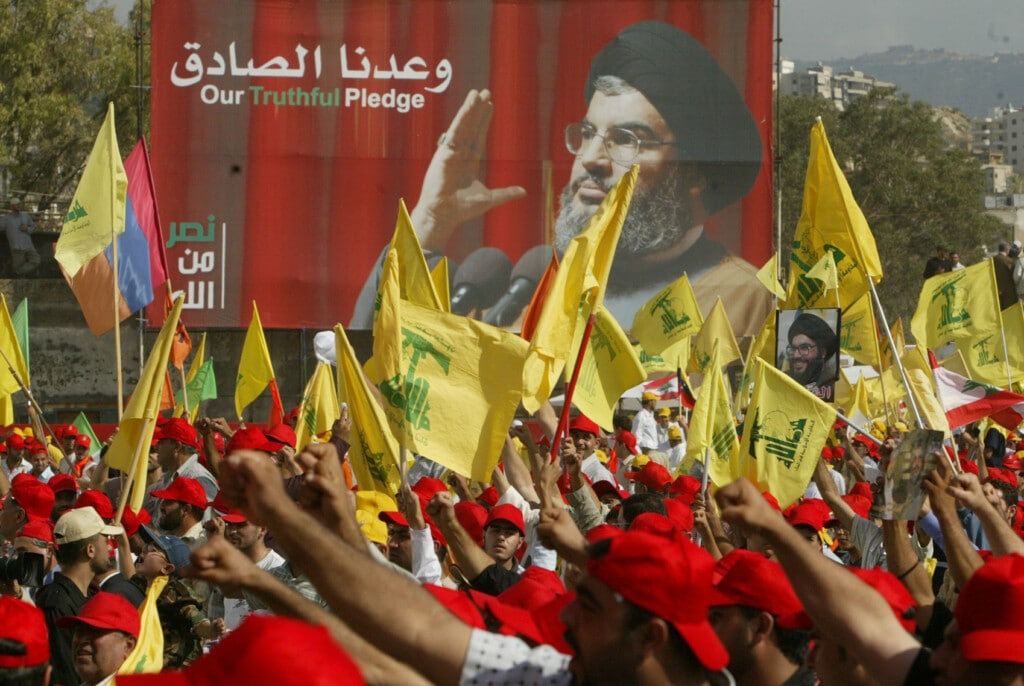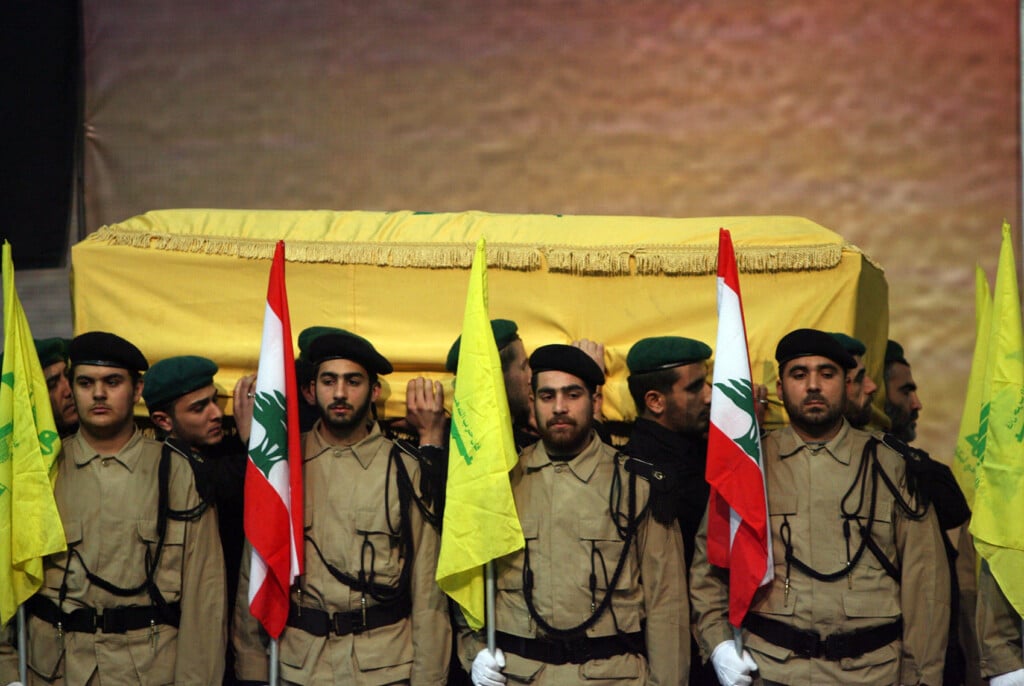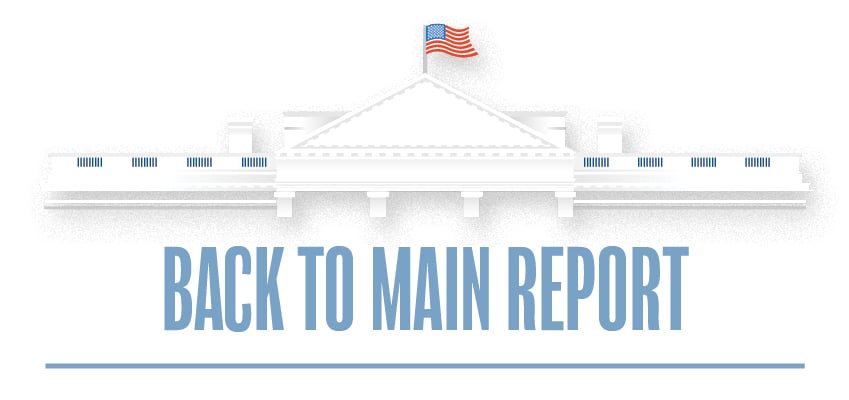January 31, 2019 | Midterm Assessment
Midterm Assessment: Hezbollah
Contents
January 31, 2019 | Midterm Assessment
Midterm Assessment: Hezbollah
Current Policy
The Trump administration has escalated the use of sanctions and criminal investigations to intensify the pressure on Hezbollah’s global threat networks. This effort has prioritized financial warfare initiatives designed to disrupt the transnational illicit networks that raise and launder hundreds of millions of dollars for the terrorist group each year.
The administration has sought to separate this policy of pressure from its overall policy toward Lebanon, where Hezbollah reigns supreme. With the expressed position of safeguarding Lebanon’s stability, the administration has continued its financial and political support to Lebanon’s so-called “state institutions,” namely the Lebanese Armed Forces (LAF). In addition, the administration has tried, without success, to beef up the mandate of the United Nations Interim Force in Lebanon (UNIFIL) in an attempt to constrict Hezbollah activities in south Lebanon. However, despite its continued support, the administration has not asked the LAF and the Lebanese government to take meaningful action against Hezbollah, focusing instead on sanctions compliance and the banking sector. Since last December, Israel has uncovered six Hezbollah-built tunnels, crossing from Lebanon into Israeli territory1 – a flagrant violation of UN Security Council Resolution 1701 and a gross failure on the part of the LAF and UNIFIL to fulfill their duties under the resolution. The Department of Defense announced in January 2019 that it was giving the LAF another $100 million aid package regardless.2
On the law enforcement front, an early and important achievement was the arrest in Morocco of Hezbollah financier Qassem Tajeddine in March 2017. Along with his brothers, Tajeddine ran numerous front companies for Hezbollah in Africa. After Tajeddine’s extradition to the U.S., he pleaded guilty to evading sanctions.3
Other key arrests drew on improved cooperation between the U.S. and foreign governments.4 A pivotal case in point concerns the Tri-Border Area (TBA) of South America, where Paraguay, Argentina, and Brazil converge. Prior to the Trump presidency, Paraguayan authorities, with U.S. assistance, arrested a suspected Hezbollah drug trafficker in August 2016. In June 2017, they extradited him to the U.S. Subsequent U.S.-Paraguayan cooperation led to the arrest of two more suspected Hezbollah financiers in May and June 2018 and their extradition to the U.S. in November 2018.5
Most recently, U.S.-Argentinian cooperation led, in July 2018, to exposing a money-laundering scheme linked to Ahmad Assad Barakat, a key Hezbollah financier in the TBA whom Treasury sanctioned in 2004.6 Brazilian authorities arrested Barakat in September.
The administration’s renewed focus on Hezbollah was reflected in the Department of Justice’s decision to create the Hezbollah Financing and Narcoterrorism Team (HFNT),7 whose goal was to revive the Drug Enforcement Administration’s successful Project Cassandra investigations, which the Obama administration derailed.8 In October 2018, then-Attorney General Jeff Sessions identified Hezbollah, along with four Central and South American cartels and gangs, as the “top transnational organized crime threats” to the U.S. today.9 Sessions specifically described Hezbollah as a “transnational criminal organization,” an overdue recognition that crime has become just as integral to the group as terrorism.
The efforts of the Treasury Department have likewise intensified under the Trump administration. In 2018, the Treasury Department made over 30 Hezbollah-related sanctions designations, the most in a single year. Most of these designations targeted the network of Adham Tabaja, a Hezbollah financier who, alongside senior Hezbollah official Abdallah Safieddine, runs the group’s criminal enterprise.10 The designations focused in particular on Tabaja’s network in Iraq, but also targeted his associates in Africa, Belgium, and Lebanon.11
Other important initiatives at Treasury include coordinating with Persian Gulf allies through the creation of the Terrorist Financing Targeting Center in May 2017, which led to joint sanctions on Hezbollah. Treasury is also pressuring Lebanon’s banking sector to improve its compliance with U.S. sanctions.

Supporters wave portraits of Hezbollah leader Hassan Nasrallah during a “Victory over Israel” rally in Beirut’s suburbs on September 22, 2006 in Beirut, Lebanon. (Photo by Salah Malkawi/Getty Images)
Assessment
The U.S. Justice and Treasury Departments’ aggressive targeting of Hezbollah is a powerful tool for efforts to constrain and deter the global activities of one of the world’s most dangerous terrorist groups. The Trump administration’s decision to prioritize the use of law enforcement and sanctions against Hezbollah was an important policy initiative.
But a comprehensive anti-Hezbollah policy should go beyond law enforcement and sanctions to address Hezbollah’s growing domination of Lebanon – the group’s main base of political and military power, and the epicenter of its operations to threaten key U.S. allies and interests across the Middle East on behalf of its Iranian patrons.
The administration’s concern for the stability of the Lebanese banking sector and overall economy also clashes with the reality of Hezbollah domination.
Much like its predecessor, the Trump administration has sought to avoid acknowledging Hezbollah’s total control over Lebanon. Instead, it maintains that the best way to contest Hezbollah’s influence is by strengthening Lebanese state institutions, especially the LAF. A 2017 White House notice affirmed the administration’s commitment “to supporting legitimate state institutions in Lebanon and … to expose Hizballah’s nefarious behavior.”12
The fatal flaw of this approach is that state institutions are often complicit with Hezbollah and facilitate its activities. In May 2018, Hezbollah’s political coalition won a majority in Parliament, which will give it control of the next government. As a result, Hezbollah will directly control lucrative ministries, like the Ministry of Public Health. In the past, Hezbollah has used this and other ministries, such as the Ministries of Social Affairs and Agriculture, to benefit affiliated organizations. For example, the government allocated $2 million in grant money in 2017 from Western donor institutions to the Ministry of Social Affairs, which in turn awarded the money to various local organizations, including the Mahdi Scouts, Hezbollah’s youth organization.13 The potential for Hezbollah’s financial gain from the health sector should not be dismissed.
The administration’s concern for the stability of the Lebanese banking sector and overall economy also clashes with the reality of Hezbollah domination. Treasury’s October designation of Muhammad Abdallah al-Amin – a member of Adham Tabaja’s Hezbollah finance network – is instructive in this regard. Al-Amin’s designation shows he has held significant funds in his name in Lebanese banks on behalf of Tabaja. He also served as a liaison between Tabaja and banking officials.14
While it is likely that Lebanese banks will want to comply with Treasury’s requirements, assessing their efficacy will be tricky, given the ubiquitous nature of Hezbollah’s financial operations in Lebanon and the difficulty of determining the provenance of overseas remittances into the country. A case in point: Lebanese banks worked with al-Amin until his designation. Moreover, al-Amin’s companies dealt in food, energy, merchandise distribution, and advertising, which underscored how entangled Hezbollah’s finances are with the Lebanese economy. If the administration pulls punches for fear of destabilizing Lebanon’s economy, Hezbollah will find workarounds.
In addition, while most of the administration condemned Hezbollah’s tunnels, the condemnation was incomplete in that it failed to assign proper responsibility to the Lebanese government for this violation of UN Security Council Resolution 1701, often omitting to mention Lebanon altogether or doubling down on praise and commitment to the LAF. The Defense Department managed to do something worse with its announcement of a $100 million aid package to the LAF, even as Israel’s operation to uncover and neutralize the tunnels was still ongoing. In so doing, it only reinforced Beirut’s conviction that, no matter their dereliction or even complicity in Hezbollah’s actions, U.S. political and financial support will remain unshakable.
Secretary of State Mike Pompeo declared last May that the administration “will track down Iranian operatives and their Hizballah proxies” and “crush them.”15 Meeting this goal will require far more than financial and law enforcement pressure.

Funeral of Hezbollah commander in Beirut. (Photo by Salah Malkawi/ Getty Images)
Recommendations
- Support Israel’s use of hard power against Hezbollah in Syria. The U.S. should make clear it stands behind Israel to ensure the Russians do not complicate Israel’s ability to prevent Iran from shipping advanced weapons to Hezbollah.
- Coordinate a joint strategy with Israel as it targets Hezbollah assets in Syria. The U.S. and Israel should develop a joint approach to targeting Hezbollah military infrastructure and logistical routes in Syria. This could include, but not be limited to, sharing intelligence and targeting information.
- Condition aid to the LAF on prevention of weapons smuggling and illicit weapons manufacturing. Recent media reports indicate intensified Iranian smuggling through Beirut International Airport of components to increase the accuracy of Hezbollah’s missiles.16 If the LAF remains unwilling or incapable of preventing such activity, even after receiving hundreds of millions of dollars from U.S. aid over the past decade, it is no longer a viable partner.
- Warn Lebanon it may become a target. The U.S. should communicate to the Lebanese that it would back Israeli military action in Lebanon against, but not limited to, targets used to upgrade Hezbollah’s capabilities.
- Enforce existing sanctions on Iranian airlines using Beirut International Airport to bring in weapons or military equipment. The U.S. recently sanctioned Qeshm Fars Air, the Iranian cargo carrier implicated by recent media reports in the delivery of guidance systems to Beirut. Entities involved in procuring and selling aircraft – two old Boeing 747s – to the airline have not been identified or punished.
- Formalize Hezbollah’s designation as a Transnational Criminal Organization (TCO). Many governments, including in Africa and Latin America, are reluctant to treat Hezbollah and its local networks as a terrorist organization. A TCO designation would lead them to take the criminal threat from Hezbollah more seriously.
- Support the Department of Justice’s newly established task forces to combat Hezbollah’s terror finance. The administration should invest significant resources in empowering its newly established HFNT and TCO Task Force. In particular, it should increase resources assigned to law enforcement agencies and intelligence gathering to enlarge the volume of cases the task forces are able to pursue and successfully prosecute.
- Leverage newly passed legislation to go after Hezbollah facilitators globally. The Hizballah International Financing and Prevention Amendments Act of 2018 (HIFPAA) imposes mandatory sanctions on foreign persons who recruit and raise funds on behalf of the group. It also sanctions foreign states, agencies, and instrumentalities of a foreign state that support Hezbollah. HIFPAA thus opens the door for the administration to target Hezbollah fundraising activities overseas, even in countries that have not yet blacklisted the group, for example in Europe, Africa, and Latin America. The administration could also target Lebanese ministries and government agencies that fund Hezbollah-run organizations or projects, as well as an expanded range of Iranian actors. Finally, pressure and the threat of sanctions on Lebanese banks should continue. Such actions could severely destabilize Lebanon’s economy, and are thus the strongest incentive for Lebanon’s financial system to quarantine Hezbollah’s financial operations.
- Leverage newly passed legislation to go after Hezbollah (and Iranian) use of human shields. As shown by the recent discovery of Hezbollah-built tunnels under the Israel-Lebanon border, Hezbollah continues to hide its military infrastructure behind or under civilian infrastructure. The Sanctioning the Use of Civilians as Defenseless Shields Act requires the president to name those Hezbollah operatives and supporters involved in this activity. By demonstrating that Hezbollah and Iran deliberately and systematically place military assets in locations that ensure civilian casualties, the U.S. can discredit false claims that democratic governments, which oppose Hezbollah and Iran, are responsible for harm to civilians.17
